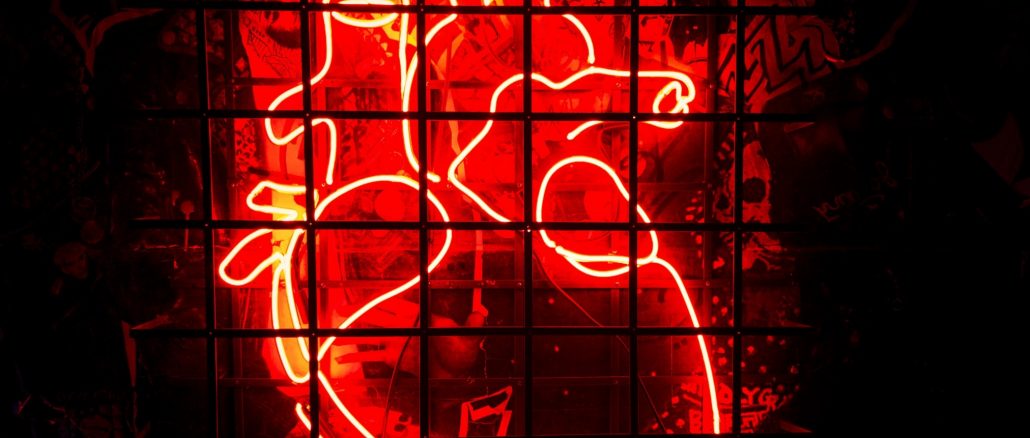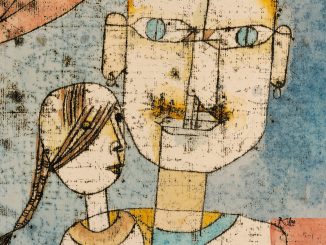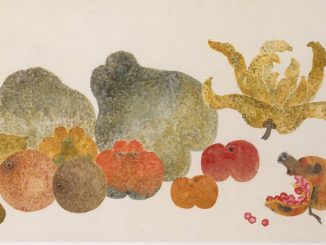
I have always simultaneously loved and been terrified of the ocean. Having grown up in Florida, I’m drawn to coastlines like nothing else. So back in Ohio, I crave the pungency of salt air, sun on my skin, my toes sinking into sand. I have been lulled to my best sleeps by the sound of waves crashing onto the shore. But nearly every time I’ve ventured into the ocean, I’ve been concerned about what I can’t see below its surface: stingrays and man o’ wars in the Gulf of Mexico, jellyfish and sea urchins along the Adriatic; or of the tide’s power to pull me out to the point of no return. So as much as I love the idea of doing so, I’ve never been able to truly give myself over to the sea. If I venture until I can’t touch the bottom, or until I feel the cooler currents of deep water swirling around my legs, I panic and swim toward shore as quickly (and somewhat frantically) as possible.
Today, one week after arriving in Kamala, Thailand, six days after losing my passport and credit cards, I woke up to the news that an old acquaintance died almost two months ago. He was more than an acquaintance. He was a blues piano player I dated while I was in college, my first long-term relationship, my first and last physically abusive relationship. We parted ways over twenty years ago with my filing a restraining order against him, though he’s sporadically attempted to contact me several times since that court date. At first, when I still lived in Tampa, he’d leave incense and bags of coffee on my doorstep, just, I think, to let me know that he knew where I was after several moves. Over a decade later, he tracked down my aunt, living in Miami at the time. She had no knowledge of our relationship, so when he identified himself as an old friend of mine, she told him I was living in Ohio and teaching at a university there.
He started leaving messages on my office phone in quick succession, beginning with an “I don’t mean you any harm. You’ve just been on my mind and I’d like to know how you’ve been,” and several messages later, “Why won’t you answer the fucking phone? You think I don’t know you’re still the same lousy bitch you were then? I may not know where you live, but I know where you make your money, and I’m fully capable of coming there. Can’t you see I still love you?”
Later, the messages would be left on my home phone, several at a time over the course of a week or two every few years. My stomach still turns every time the phone rings with an unknown number. My son knows not to answer if the caller ID shows an 813 area code. The most recent messages were left about a year ago, though they never escalated to his typical fierceness. They were more pleading, more apologetic about the way things had gone between us. He said he didn’t want anything except for me to hear him out, that he was in poor health, that he needed to talk to me before it was too late. It was the first time I considered calling him back, fully confident in my safety from him, curious to know what he had to say. But at the same time, I didn’t think he deserved the satisfaction or peace of clearing his conscience of his wrongs. And after doling out three years of physical abuse, paranoia, maniacal mood swings, there should have been many wrongs on his conscience. More honestly, I didn’t fully trust myself to have a conversation with him. Even after twenty years of other relationships, therapy, moving on with my life, I remembered all too clearly how easily he’d been able to lure me back in. I’d broken up with him at least a half dozen times before our final split.
But this essay isn’t about that relationship. I got the email from a woman he’d started seeing shortly before our last physical altercation, one whose life had remained entangled with his for the last two decades. She’d contacted me through LinkedIn after his last string of voicemail messages to tell me that she was no longer “with” him but that they were still friends and that she knew that he desperately wanted to talk to me. I looked up his police records then and saw that she’d filed and dropped domestic violence charges against him three different times over the years. The email she sent last night said that she still talked to him every few days and they had dinner together once a month or so. She said that she saw him the day before he died. She said that he “took responsibility for things and apologized.” She said that she was glad she’d found closure with him before it was too late. I can’t help but read that as a bit of a jab at me for never returning his calls.
I read the email and closed it and felt nothing. No sadness, no relief, no regret, no contentment. For years, I’d believed that he was the only person on earth I might be capable of murdering. Afterwards, I’d thought that the day I got news of his death, I’d feel a certain satisfaction. Today, there was none of that.
Today, I walked through a part of this little beach town I’d never seen before. I found a grocery store that offered hot fried rice for only 9 baht. I sat on the curb outside and ate it, washing it down with a warm bottle of water, the kind of living I haven’t navigated in years but that would have been typical routine when I was living with him, our only cash coming from bar band gig to bar band gig in those days. I did not think of him while I ate my rice, though. I thought about how grateful I was to have found a meal that was even cheaper than the toasted sandwiches at the 7-11.
And then I took the long way, down a side street filled with the smell of fresh laundry drying in the sun. I ended up at the same bridge I’ve been taking for days, the one that leads to the beach. And to the suit sellers and the massage stands and the tiki bars; I walked past them all, and then I started small. I sat down on the shore and let the tide bury my feet in the wet sand, deeper and deeper with each wave, until they were firmly planted on the very edge of this island. I grabbed handfuls of the same sand and scrubbed my legs and chest and shoulders to exfoliate the tan I’ve acquired over the last few days. And then I stood and pulled my feet, one at a time, out of Thailand. I walked into the ocean.
I’d been in the water several times a day every day since coming to Kamala. But this time, I walked until I was chin deep in the Andaman Sea. And then I lifted my legs and let my head fall back so I could float. I closed my eyes and listened to the only sounds I could hear: the near-silent roll of the ocean and my own louder-in-my-ears breath, my own heartbeat. I let my arms float out from my sides until only my fingertips, face, and toes were above the water. The breeze came again and the cooler currents of deep water came and I had no idea how far the tide might carry me out or in. I can’t tell you for sure how long I floated, but I’m guessing it was six or seven minutes. In that time, I felt small anxieties about distance and things I could not see roll through me again and again, but I forced myself to stay afloat until I could remain content and relaxed for thirty breaths, the time I’d arbitrarily decided it would take to prove to myself and whatever other forces might be paying attention that I was letting it all go, that I was giving myself over.
When I lowered my legs, I couldn’t touch the bottom. I was surrounded by cold water, not just random currents of coolness. I wasn’t as far out as the buoys marking the edge of the swimming area, but I was about ¾ of the way there, much further than I would have ventured the day before. I didn’t panic. I treaded water for a couple of minutes and then slowly swam back to shore.
I sat on the beach for a long time, probably too long, judging from the tightness of the skin on my shoulders this evening. And I thought about him, thought about all of him: how deeply troubled he’d been for the majority of his life, how utterly talented and brilliant he was, how confusing my time with him had been, how passionate (for better and worse) our relationship had become. And I thought about how I made it out of that relationship the same way I’m making it out of Thailand … more or less on my own, because, as was the case twenty years ago, I’m in a spot where there’s little help anyone else can offer, though I’m also full of gratitude for learning to accept the gestures of generosity that can make a difference.
I walked back to my room, took a shower, started writing this essay, and halfway through, the hotel owner, Rapeeporn, knocked on my door to let me know the wire I’ve been waiting on for days had finally come through, a day before we’d expected it. Her husband was on his way to the bank to withdraw my money. After repaying what I’d borrowed from her and covering my room for the last several days, I have $231 to my name, a plane ticket to Bangkok tomorrow, an appointment at the embassy on Wednesday, another ticket to Seattle on Thursday, and a final one back home to Columbus on Friday.
I still don’t know what forces, if any, are at play in the way the universe works. It seems more than a little irrational to think that whatever they may be were conspiring to align the news of his death with a symbolic act of letting go before allowing me to find some sort of resolution to the mess I’ve been wading through for the last few days. But as ambivalent as I am about believing in higher powers, I am equally ambivalent about believing that any experience is purely coincidental, especially ones that seem as interconnected as these.
What I know is that this experience that’s unfolded over the last few days, it isn’t about lost passports or credit cards or misguided illusions of love; it is about what we gain by losing. And what we gain by letting go of whatever notions we have about being in complete control. It is about learning what it means to trust again, to put faith in complete strangers and more difficultly, in those closest to us. It’s about what it means to truly open oneself to everything that comes at us. And I wish I could know with as much certainty that I’ll be able to hang on to this perspective, permanently and for the better, even after I get home and become the version of myself I’ll be there, but I don’t believe that’s the way things really work. It is, after all, one thing to kick up one’s legs in the Andaman Sea and quite another to love as fiercely and un-self-consciously as I did when I was 20.
But I have twenty-four hours left on this island, and I’m heading out shortly for dinner; along the way, I’ll look for a candle I can light in the hotel room later to acknowledge the end of one life and the beginning of another. Tonight, I will sleep better than I have in years, and tomorrow I’ll start out for home as a different woman than the one who left, one who’s at least more aware now of the importance of the lessons—not because he died, but because I’ve learned what it takes to truly float.
 SHANNON LAKANEN teaches essay writing on the outskirts of Columbus, Ohio, at Otterbein University, Marion Correctional Institution, and Ohio Reformatory for Women. Her work has been published in Tusculum Review, Fourth Genre, Quarter After Eight, North Dakota Quarterly, and After Montaigne: Contemporary Essayists Cover the Essays (U Georgia Press, 2015).
SHANNON LAKANEN teaches essay writing on the outskirts of Columbus, Ohio, at Otterbein University, Marion Correctional Institution, and Ohio Reformatory for Women. Her work has been published in Tusculum Review, Fourth Genre, Quarter After Eight, North Dakota Quarterly, and After Montaigne: Contemporary Essayists Cover the Essays (U Georgia Press, 2015).
Instagram: @slakanen
Featured image: Photograph by Olivier Collet on Unsplash.


